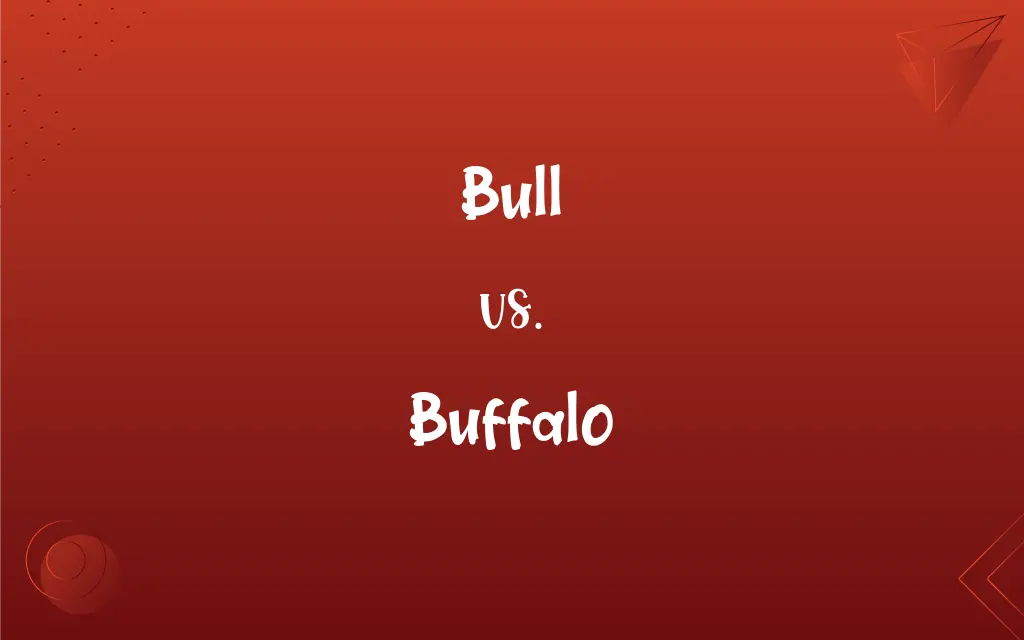Bull vs. Buffalo: What's the Difference?
Edited by Harlon Moss || By Janet White || Published on December 22, 2023
A bull is a male bovine, particularly of domestic cattle, while a buffalo is a large wild bovine species, common in Asia and Africa.

Key Differences
Bulls are the male counterparts of the cattle species, often associated with farming and domestication. They are known for their size, strength, and aggressive behavior during mating seasons. Buffaloes, on the other hand, refer to large wild bovine species, notably the Asian water buffalo and the African buffalo, known for their large horns and robust build.
Bulls play a significant role in dairy and meat production industries. They are selectively bred for various traits, including temperament, size, and meat quality. In contrast, buffaloes are often associated with their utility in labor-intensive tasks, particularly in Asian agriculture, and are also valued for their meat and milk.
The physical characteristics of bulls include a muscular frame, a broad and bony head, and, in many breeds, prominent horns. Buffaloes have distinctive large horns that can span over six feet in some species, a heavy body, and a relatively high shoulder hump.
In cultural contexts, bulls have various symbolic meanings, often representing strength and virility in folklore and mythology. Buffaloes hold significant cultural and economic importance in many Asian and African societies, symbolizing abundance and the sustenance of life.
Bulls are integral to bullfighting and rodeo events, showcasing their strength and agility. Buffaloes, especially the wild African species, are known for their unpredictable nature and are often featured in wildlife documentaries and conservation efforts.
ADVERTISEMENT
Comparison Chart
Species
Domestic cattle (male)
Large wild bovine (Asian and African species)
Role
Dairy and meat production, breeding
Labor, meat, milk, cultural significance
Physical Features
Muscular, broad head, horns in some breeds
Large horns, heavy body, shoulder hump
Cultural Significance
Symbol of strength, involved in sports
Economic and spiritual value in certain cultures
Behavior
Aggressive during mating seasons
Wild, unpredictable in nature
ADVERTISEMENT
Bull and Buffalo Definitions
Bull
A participant in stock markets who expects prices to rise.
Bulls were optimistic about the market's future.
Buffalo
The American bison, often incorrectly called buffalo.
The American buffalo roams the plains of the Midwest.
Bull
An adult male of certain large animals, like elephants or seals.
The bull elephant led the herd.
Buffalo
A city in New York, known for its snowfall and wings.
We visited Buffalo during its famous winter festival.
Bull
Informal term for nonsensical or false talk.
He dismissed the rumors as bull.
Buffalo
To intimidate or baffle.
He was completely buffaloed by the complex instructions.
Bull
A male bovine animal, especially of domestic cattle.
The farmer introduced a new bull to improve the herd.
Buffalo
Used metaphorically to describe something robust or unyielding.
He's tough as a buffalo in negotiations.
Bull
A symbol of strength and virility in various cultures.
The ancient sculpture depicted a bull as a symbol of power.
Buffalo
A large bovine animal, common in Asia and Africa.
Water buffaloes are essential in rice farming in Asia.
Bull
An adult male bovine mammal.
Buffalo
Any of several large African and Asian ruminant mammals of the family Bovidae, such as the water buffalo and the African buffalo.
Bull
The uncastrated adult male of domestic cattle.
Buffalo
The American bison (Bison bison).
FAQs
Is a bull always a domestic animal?
Primarily, but the term can refer to males of other large species.
Can bulls be found in the wild?
Rarely, as they are mostly domesticated cattle.
Do bulls have any significance in finance?
Yes, as a term for market optimists.
Are buffaloes domesticated like bulls?
Some species, like the Asian water buffalo, are domesticated.
Is buffalo milk used like cow's milk?
Yes, particularly in parts of Asia.
Can the term 'bull' refer to nonsense?
Informally, it can mean nonsensical talk.
Is bullfighting related to bulls?
Yes, it involves bulls in a sporting context.
Do buffaloes have cultural importance?
Yes, in many Asian and African societies.
Are buffaloes used in agriculture?
Yes, especially in Asian countries.
Are American buffaloes true buffaloes?
No, they're more accurately bison.
How are buffaloes adapted to their environment?
With features like large horns and robust bodies.
Are bulls used in labor like buffaloes?
Not typically; they're more for breeding and production.
Are all bulls aggressive?
They can be, especially during mating seasons.
Can buffalo refer to a U.S. city?
Yes, Buffalo is a city in New York.
Is buffalo meat consumed?
Yes, particularly in certain regions.
Are there different breeds of bulls?
Yes, with various traits for dairy or meat.
Are buffaloes endangered?
Some species, like the African buffalo, face conservation issues.
Can the word buffalo mean to confuse?
Yes, it's used as a verb in that sense.
Do bulls play a role in mythology?
Yes, symbolizing strength in various cultures.
Can bulls and buffaloes interbreed?
No, they are different species.
About Author
Written by
Janet WhiteJanet White has been an esteemed writer and blogger for Difference Wiki. Holding a Master's degree in Science and Medical Journalism from the prestigious Boston University, she has consistently demonstrated her expertise and passion for her field. When she's not immersed in her work, Janet relishes her time exercising, delving into a good book, and cherishing moments with friends and family.
Edited by
Harlon MossHarlon is a seasoned quality moderator and accomplished content writer for Difference Wiki. An alumnus of the prestigious University of California, he earned his degree in Computer Science. Leveraging his academic background, Harlon brings a meticulous and informed perspective to his work, ensuring content accuracy and excellence.






































































